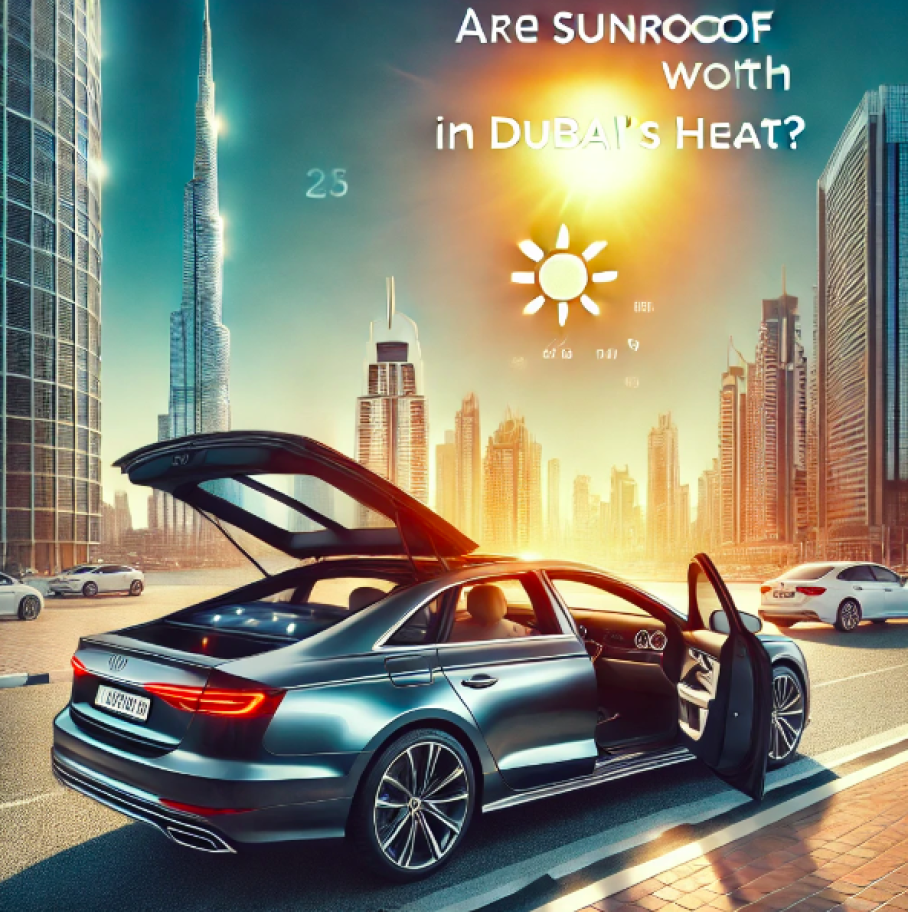

Are Sunroofs Worth It in Dubai’s Heat?
Sunroofs are a popular feature in many modern cars, adding a touch of luxury and openness to the driving experience. Whether it’s a panoramic sunroof or a standard tilt-and-slide design, many car buyers in Dubai consider this feature when purchasing a vehicle. But with Dubai’s extreme heat, is a sunroof a worthwhile investment, or does it create more problems than benefits? Let’s explore the pros and cons of having a sunroof in Dubai.
Pros of Having a Sunroof in Dubai
1. Enhanced Driving Experience
A sunroof can make your car’s cabin feel more spacious and airy. It allows natural light to enter, making the interior feel less confined—especially beneficial in high-end cars like the Mercedes-Benz S-Class, BMW 7 Series, and Audi A8.
2. Improved Ventilation
During cooler months, a sunroof can provide extra ventilation without fully opening the windows. This is ideal for reducing stuffiness inside the car while driving along scenic roads like Jumeirah Beach Road or the open highways of Al Qudra.
3. Aesthetic Appeal and Higher Resale Value
Cars with sunroofs are often seen as more premium, which can enhance their resale value. If you’re selling a used car in Dubai, having a sunroof can be an attractive feature for potential buyers. Luxury brands like Lexus, Range Rover, and Porsche often include sunroofs as a standard or optional upgrade, making them desirable in the used car market.
Cons of Having a Sunroof in Dubai
1. Increased Cabin Heat
Dubai’s summer temperatures can exceed 45°C, and a sunroof can contribute to excessive heat buildup inside the car. Even with sunroof covers or tinted glass, direct sunlight can make the cabin significantly hotter, requiring more air conditioning and fuel consumption.
2. Higher Maintenance Costs
Sunroofs require regular maintenance to prevent leaks and mechanical failures. Dust and sand, common in Dubai, can clog the sunroof’s drainage system, leading to potential water leaks during rare rain showers. Repairs for luxury car brands like BMW, Mercedes-Benz, and Tesla can be costly if the sunroof mechanism fails.
3. Reduced Headroom
Some cars with sunroofs have slightly less headroom due to the added mechanism. This can be an issue for taller drivers, especially in compact sedans or SUVs with lower rooflines. If headroom is a concern, it’s best to test the comfort level before purchasing.
4. Additional Weight and Lower Fuel Efficiency
Sunroofs add extra weight to a vehicle, which can slightly impact fuel efficiency. For high-performance sports cars like the Nissan GT-R, Ford Mustang, or Chevrolet Corvette, this added weight might be undesirable for those looking for optimal speed and agility.
Should You Buy a Car with a Sunroof in Dubai?
If you enjoy an open-air feel and only plan to use the sunroof in the cooler months, it can be a great feature. However, if you’re concerned about heat buildup, maintenance costs, or efficiency, you might prefer a car without a sunroof.
For those looking to buy or sell a used car in Dubai, Auto Trader UAE offers a variety of models with and without sunroofs. Check out the latest listings at www.autotraders.ae and find the perfect car for Dubai’s unique climate!